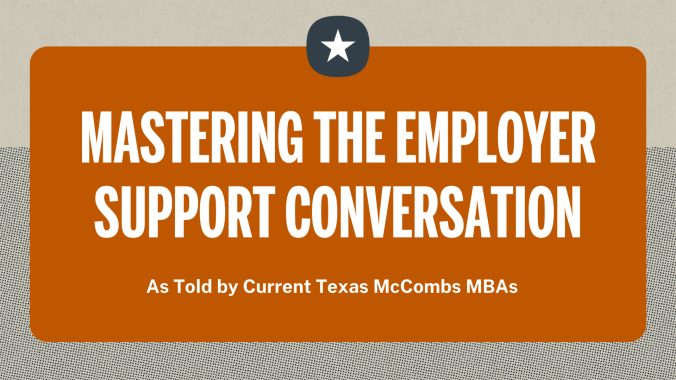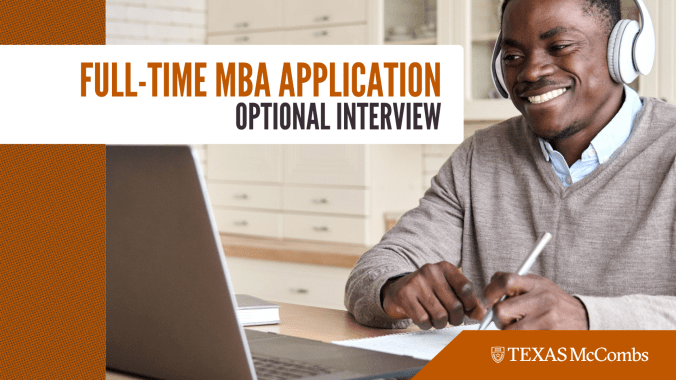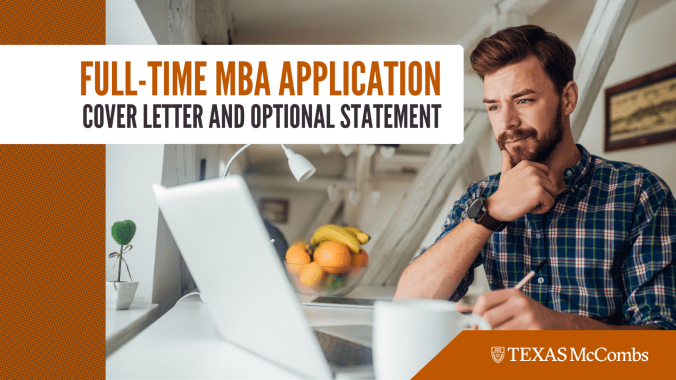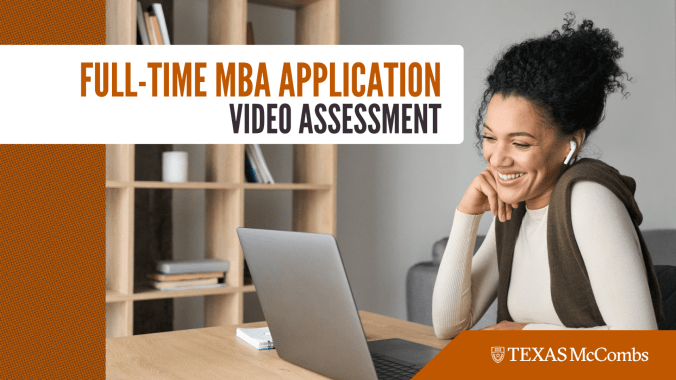An MBA recommendation letter is a concise, third-party endorsement that spotlights your leadership potential, professional achievements, and character. It’s a powerful narrative that can validate the claims you make elsewhere in your application and reveal dimensions of your experience that transcripts, test scores, and resumes can’t capture.
Admissions committees at every world-class school of business, including Texas McCombs, lean on these letters to understand how you lead teams, tackle challenges, and inspire results. A compelling MBA recommendation can elevate your entire application, while a lukewarm note may undermine your competitiveness in the admissions process.
Texas McCombs sets clear expectations and deadlines for the recommendation process, so it’s smart to get familiar with them well before you hit “submit.” Knowing what we require — and when — gives you the runway to choose the right advocate and equip them to advocate for you brilliantly.
With this guide, you’ll have a roadmap to secure an MBA recommendation letter that underscores your value and aligns perfectly with Texas McCombs’ emphasis on leadership, innovation, and community impact.
What Is an MBA Recommendation Letter: Definition and Importance
Think of your MBA recommendation letter as a professional spotlight — one that’s directed by someone who has witnessed your growth firsthand. Its primary purpose is to deliver a credible, third-party evaluation of your abilities, leadership potential, and character. When a direct supervisor or respected mentor vouches for your performance with specific examples, admissions committees gain invaluable insight into who you are.
They balance quantitative metrics — like GPA, test scores, and master program courses — with qualitative evidence of how you collaborate, make decisions, and elevate those around you. A well-crafted recommendation helps schools envision you thriving in team projects, case competitions, and future boardrooms.
Texas McCombs sees each letter as a chance to confirm your readiness to lead through disruption and contribute to a dynamic community.
Our Recommendation Letter Requirements
Texas McCombs keeps the process straightforward: you need one professional recommendation submitted through our online application portal. We strongly prefer a direct supervisor or someone who manages your work, because they can speak in detail to your impact, leadership style, and growth trajectory. Academic references are rarely as effective given the context and nature of the relationship.
We use the industry-standard Common Letter of Recommendation (LOR) format, designed to streamline the process for both applicants and recommenders. That means we do not accept a traditional “Dear Admissions Committee” attachment, nor do we allow recommenders to write “please see attached letter” in the form. Instead, they’ll answer targeted questions inside the portal, ensuring each response aligns with the competencies our admissions committee values.
Here’s how the submission works:
- While completing your application, you’ll enter your recommender’s email address.
- Our system immediately sends an invitation with secure login details.
- Once your recommender submits the form, you’ll receive an automated confirmation email.
Behind the scenes, our reviewers evaluate each recommendation alongside your essays, resume, and test scores, looking for consistency and depth. We want specific examples that highlight leadership potential, collaboration, and integrity — qualities central to the Texas McCombs culture.
Here’s an example of the standard recommendation template your advocate will follow.
What Should a Strong MBA Recommendation Letter Include?
Admissions readers scan hundreds of letters every cycle, so a standout MBA recommendation hits two marks simultaneously: it showcases the qualities Texas McCombs values most, and it delivers those insights in a clear, structured narrative.
Below are the attributes our committee looks for:
- Leadership potential
- Professional achievements and impact
- Collaboration and communication skills
- Problem-solving ability under pressure
- Integrity and character
A powerful letter recommendation follows a simple, effective framework:
- Introduction: Who the recommender is, how long they’ve known you, and what their relationship with you is — like a direct report, boss, or peer.
- Key qualities + stories: Concrete anecdotes that illustrate your leadership, teamwork, and strategic thinking.
- Constructive feedback: Honest reflection on an area of growth and how you responded.
- Final endorsement: A definitive statement of support, complete with contact information.
Here’s a concise excerpt that captures these elements:
“As Jane’s direct supervisor for three years, I’ve watched her transform an underperforming analytics team into a high-impact unit that increased revenue forecasting accuracy by 18%. She pairs data fluency with empathetic leadership, motivating colleagues across finance, marketing, and private equity sales to rally behind bold, data-driven strategies. When I tasked her with leading a cross-border project, she navigated cultural nuances and tight timelines with integrity, delivering results ahead of schedule. I strongly recommend Jane for the Texas McCombs MBA program, confident she’ll elevate classroom discussions and team outcomes alike.”
Avoiding Common Pitfalls
Even seasoned leaders can stumble when they write MBA recommendation letters. Watch out for these traps:
- Generic language that could describe anyone in your cohort.
- Vague praise without numbers, timelines, or specific examples.
- Missed deadlines that delay your entire MBA package.
- Accidental references to another school business — a quick credibility killer.
Instead, ensure you follow these quick tips:
- Provide your recommender with your résumé, personal statement, and key deadlines.
- Highlight two or three accomplishments you’d love them to emphasize.
- Set up time to discuss your request for a recommendation before entering the person’s email address in the application. This will give them a heads up on your expectations and ensure you’re aligned.
- Send gentle reminders as the deadline approaches; a timely letter reflects well on your organizational skills.
How To Choose and Ask the Right Advocate
Your recommender isn’t just writing a letter; they’re championing your candidacy to the MBA admissions team. Selecting the right advocate — and equipping them to succeed — can determine whether your application narrative feels cohesive and compelling.
Who Makes the Strongest Advocate?
When it comes to your academic future, not just anyone will be able to recommend you. Here are the best people to ask:
Your Supervisor
Your current direct supervisor is traditionally the best choice. This is likely the person in your network who knows your strengths and weaknesses better than anyone else. However, this may not be a viable option for you. Perhaps you aren’t able to communicate to your employer that you’re applying to business school, or you do not work with your direct boss that closely. It could also be that you attained a new role recently, and your current supervisor has not had a chance to work with you very much. Or you’re an entrepreneur & don’t have a supervisor.
Your Former Supervisor
If you cannot ask your current direct supervisor to write your recommendation, maybe you can ask a previous supervisor? Depending on how recently you worked with them, the “old boss” may be the best choice, especially if you had a strong professional relationship with that person. This is also a very common option.
Your Indirect Supervisor
Asking an indirect supervisor can be another option, especially if you’ve worked with this person closely on past assignments or long-term projects. This is a nice alternative to a supervisor that you may not work with closely.
Your Client or Vendor
This type of recommendation source is especially useful for entrepreneurs or for applicants who work for a family business. If you work for a family business, it is preferred that you ask an individual outside of your family to write your MBA letter of recommendation.
Your Mentor
Mentors inside or outside of your workplace are great to have in your corner when it comes time to apply to business school. However, be sure that your mentor has a clear understanding of your current professional value, not just your potential or future goals. Select a mentor with whom you have worked on measurable tasks to ensure that they will provide a recommendation with depth. Keep in mind that the admissions committee is looking for someone who has worked with you professionally.
What To Hand Over
- An updated résumé highlighting key achievements.
- A brief summary of your career goals and MBA objectives.
- A one-pager on the Texas McCombs program highlights that excites you.
- A clear reminder of the application deadline and submission process.
Inside the Common LOR form, your recommender will answer three core questions:
- A 50-word description of your working relationship and role.
- A 500-word assessment of your principal strengths compared with peers.
- A 500-word account of the most important constructive feedback they’ve given you and your response.
Communicating With Your Recommenders
Clear communication unlocks stronger letters and smoother timelines. Make sure you:
- Ask four to six weeks before the deadline.
- Explain the online submission steps and deadlines up front.
- Offer to meet or call to answer any questions about the MBA program.
- Provide gentle, periodic reminders — especially one week before the due date.
- Confirm receipt once the system notifies you that the recommendation has arrived.
Expressing Gratitude
A thoughtful thank-you reinforces professional relationships and reflects the integrity McCombs cherishes. Simple yet meaningful gestures include:
- A handwritten note detailing how their mentorship has shaped your career.
- A small gift card to their favorite coffee shop or bookstore.
- An update email once you receive your admissions decision, regardless of the outcome.
By closing the loop with genuine appreciation, you not only honor their effort but also strengthen a professional bond that can last well beyond your MBA journey.
Find the People That Have Your Back
Strong recommendations don’t materialize overnight. They grow from authentic professional relationships and careful planning. Start early, brief your advocate thoroughly, and build in extra time so they can craft vivid, data-driven stories that elevate your application.
For Full-Time MBA applicants, the letter of recommendation is due at the round deadline — though if it is missing, our team reaches out and they have a chance to get it in within a reasonable time to be considered for that round. On the other hand, Working Professional and Executive applicants must turn in their request for a letter of recommendation by the application deadline, but don’t have to be completed by then. Generally, McCombs recommends you have them finished by the time you wrap up your interview and video assessment.
Aim to give your recommender at least a four-week buffer before these dates so last-minute hurdles — travel, client crises, or tech glitches — don’t derail your timeline.
Need more insight? We’re always here to clarify requirements, share best practices, and ensure you feel confident every step of the way. Take the next steps on your MBA application and find the right people to advocate for your professional experience today.













